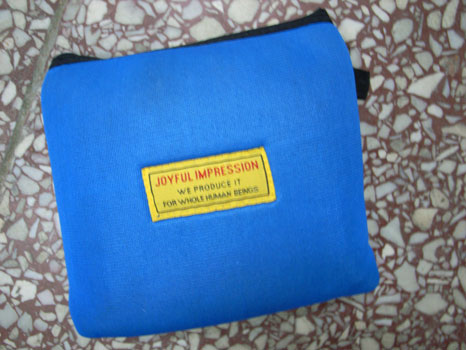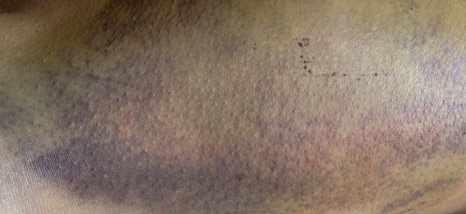
![]()
As creators, we can say that there is an audience for our work, whereby “public” is both an excuse and a reason. And yet as creators within a social sphere, our unabashed ability to colonialise spaces, and even publics, actually distances us from any notion of real interaction rather than that of working context-specific, conscientiously and in cohesion with those collaborating with us.![]() In the example of the bi/tri-ennial, the clearest cut form of discourse seems to lie not within the vocabulary of the host city, not within the realm of “the work” and at times hardly even within the actual processes of production. As recently overheard from an independent curator about the opening night party of the 2007 Shenzhen-Hong Kong Biennale of Architecture and Urbanism, “Well, that’s what we came for.”
In the example of the bi/tri-ennial, the clearest cut form of discourse seems to lie not within the vocabulary of the host city, not within the realm of “the work” and at times hardly even within the actual processes of production. As recently overheard from an independent curator about the opening night party of the 2007 Shenzhen-Hong Kong Biennale of Architecture and Urbanism, “Well, that’s what we came for.”![]() Chief curator of the Biennale Ma Qingyun is at a loss. “But we worked so hard…”
Chief curator of the Biennale Ma Qingyun is at a loss. “But we worked so hard…”![]() The bi/tri-ennial are event-based phenomenona, as new technology, “our latest project”, and another friday night scene. Critical exchange, then, takes a cue, as a breather after all that hard work—-at bars, the after-parties and nestled within the snide comments made during other people’s speeches. It is hard to understand what sort of feedback and interaction one can stimulate or expect from an event involving a mass public audience. “I hope they’ll collect the press clippings,” says one architect in the back of the taxi, on the way to a bar after the after-party. And yes, these traditional forms of review may still be helpful and necessary within a larger system of creative production. But the formality of a critic’s theoretical opinion or a blogger’s on-the-scene action shots bely the stagnancy of the actuality. The sponsor hotel where most exhibitors stay always makes for a much more active and dynamic space than that last exhibition hall.
The bi/tri-ennial are event-based phenomenona, as new technology, “our latest project”, and another friday night scene. Critical exchange, then, takes a cue, as a breather after all that hard work—-at bars, the after-parties and nestled within the snide comments made during other people’s speeches. It is hard to understand what sort of feedback and interaction one can stimulate or expect from an event involving a mass public audience. “I hope they’ll collect the press clippings,” says one architect in the back of the taxi, on the way to a bar after the after-party. And yes, these traditional forms of review may still be helpful and necessary within a larger system of creative production. But the formality of a critic’s theoretical opinion or a blogger’s on-the-scene action shots bely the stagnancy of the actuality. The sponsor hotel where most exhibitors stay always makes for a much more active and dynamic space than that last exhibition hall.![]() Where are the relationships between work, audience and creator within the framework of the art event? Are we merely using ideas as a way of colonialising the spectacle space? Working carries over into presentation carries over into documentation carries over into publicisation. And where again is the space for the work? Somewhere between making contacts and trying to catch hold of the installation team to get the right equipment.
Where are the relationships between work, audience and creator within the framework of the art event? Are we merely using ideas as a way of colonialising the spectacle space? Working carries over into presentation carries over into documentation carries over into publicisation. And where again is the space for the work? Somewhere between making contacts and trying to catch hold of the installation team to get the right equipment.
![]() This is not meant to bemoan the poor artist who tries to be simultaneously active in all of these areas of art production. Nor can we blame the event structure alone. But is it naïve to still long for project-based work that does not neglect the need for post-planning, responsibility and respect for the other?
This is not meant to bemoan the poor artist who tries to be simultaneously active in all of these areas of art production. Nor can we blame the event structure alone. But is it naïve to still long for project-based work that does not neglect the need for post-planning, responsibility and respect for the other?![]() Would it be possible to leave an event of this kind without a feeling of the morning-after?
Would it be possible to leave an event of this kind without a feeling of the morning-after?
after “The Laugh of the Medusa”: Je suis femme, mais ceci n’est qu’une tentative l’écriture féminine (still learning)
When she was young, she wanted to be a writer. She wasn’t yet a woman, and thus had not yet learned of what she was capable, and of what she shouldn’t be capable. When one is young, emotions and outbursts and all of the new knowledge of the world flow freely as growth, sexless and unafraid. When one is an infant, there is nothing more enchanting, more delicious, more upsetting, or more terrifying than that of the present moment; this is the fearlessness of childhood feeling. Her words, as intensities, would do that to her, unleashed like her stories and streams and “a world of searching”.
But it was ironically when she entered the university that she was suddenly labeled a foreigner in her world of words. Not to say she wasn’t included. She could now count herself equally among the Others: female and foreign.![]() Not until many years later did she realise that this was how easy it had been to shut her up! Her youthful a-sex grew out of her body, and she grew into her silence instead. The spaces within her head had always been loud, but now the reverberations cancel one another so that she forgets, so that she-grown-up-into-woman grows into herself, and that writing that had previously inscribed her childhood fantasies now inscribes into itself, disappearing like the folds of kneaded dough that slowly squash themselves with each turn of the baker’s hand.
Not until many years later did she realise that this was how easy it had been to shut her up! Her youthful a-sex grew out of her body, and she grew into her silence instead. The spaces within her head had always been loud, but now the reverberations cancel one another so that she forgets, so that she-grown-up-into-woman grows into herself, and that writing that had previously inscribed her childhood fantasies now inscribes into itself, disappearing like the folds of kneaded dough that slowly squash themselves with each turn of the baker’s hand.![]() It was in this sense that she lost the ability to write herself. Writing, as in the inscription of mind to her body, such that each was closed in turn (“Censor the body and you censor breath and speech at the same time”). She had not the idea, young woman, where it was she should find herself: in mind, in body, in words. She had learned to segregate her many selves along this process of becoming woman, because that is the nature of woman, giver, to be able to be “for you what you want me to be at the moment you look at me in a way you’ve never seen me before: at every instant.” At every instant she gives herself away; she, escapee of herself.
It was in this sense that she lost the ability to write herself. Writing, as in the inscription of mind to her body, such that each was closed in turn (“Censor the body and you censor breath and speech at the same time”). She had not the idea, young woman, where it was she should find herself: in mind, in body, in words. She had learned to segregate her many selves along this process of becoming woman, because that is the nature of woman, giver, to be able to be “for you what you want me to be at the moment you look at me in a way you’ve never seen me before: at every instant.” At every instant she gives herself away; she, escapee of herself.![]() But to where would she escape? And if she was constantly running, would she ever find? Or does finding necessitate the specificity of time-space-body-mind-word? (“The woman arriving over and over again does not stand still.”) She wanted to be everywhere, just as she wanted to be everyone, to be that “desire-that-gives”. There is a balance to be had in the giving of herself and finding it in anOther. But perhaps she had given herself away too much already.
But to where would she escape? And if she was constantly running, would she ever find? Or does finding necessitate the specificity of time-space-body-mind-word? (“The woman arriving over and over again does not stand still.”) She wanted to be everywhere, just as she wanted to be everyone, to be that “desire-that-gives”. There is a balance to be had in the giving of herself and finding it in anOther. But perhaps she had given herself away too much already.![]() In being everyone, everywhere, in wanting to love, she could not clearly differentiate anymore, because “she doesn’t ‘know’ what she’s giving, she doesn’t measure it”. She was paralysed in that flight. Her communication fell through to a generalised dis-course (lack of inter-course!). She had lost her voice. She had given herself up to the signifiers speaking through her.
In being everyone, everywhere, in wanting to love, she could not clearly differentiate anymore, because “she doesn’t ‘know’ what she’s giving, she doesn’t measure it”. She was paralysed in that flight. Her communication fell through to a generalised dis-course (lack of inter-course!). She had lost her voice. She had given herself up to the signifiers speaking through her.![]() (“In one another we will never be lacking.”) This consoled her. But it still gave no indication of direction, or balance, her own becoming, and said nothing of where, and how much “she comes in, comes-in-between herself me and you”. But if we can no longer distinguish between ourselves and the Others, she thought, if there is no outside, no distinction, no sex——then maybe we can simply lay equally, yes, “in one another”. Multiplicitous, such that there is nothing given that is not also received——not in order to, but simply, in between ourselves, me and you. This does not imply a disappearance of either identity but a recovery of the Self in the Other. Giving then outlines a wholly newfound space, still, without the requirements of preposition, the directions from you, toward me or at you. Giving, like words as they are being put to paper: “We’ve come back from always.”
(“In one another we will never be lacking.”) This consoled her. But it still gave no indication of direction, or balance, her own becoming, and said nothing of where, and how much “she comes in, comes-in-between herself me and you”. But if we can no longer distinguish between ourselves and the Others, she thought, if there is no outside, no distinction, no sex——then maybe we can simply lay equally, yes, “in one another”. Multiplicitous, such that there is nothing given that is not also received——not in order to, but simply, in between ourselves, me and you. This does not imply a disappearance of either identity but a recovery of the Self in the Other. Giving then outlines a wholly newfound space, still, without the requirements of preposition, the directions from you, toward me or at you. Giving, like words as they are being put to paper: “We’ve come back from always.”
And suddenly, she thought to write everything down…
——–
[All quotes taken from Hélene Cixous, “Le rire de la méduse”, 1975]
Posted by 丫 | reply »how i spent my time at the Venice Biennale, or, looking for mere life.
The crux of this situation is one of returning to an academic reportage—after the holiday, after the event, after stepping out of the heretofore all-encompassing realm that is the Home and learning to tell or recount (and what not) to our classmates, our teachers, our friends. Spending the entire summer hanging out by the pool and eating sandwiches with the crusts cut off may have been real life. But how much of a real life do we access, relive, or reveal when writing about our experiences, passing them on to others, or trying to capture them via other media simultaneous to the experience (i.e., photographs, audio recording, drawing, etc.)? If we make art from/of our lives are the results still a reflection of the world we live in, and how much do we really reveal about ourselves through the process? More? Less? Is life as recorded in a journal, a newspaper, an uploaded video or a painting symmetrical to “mere life”? Or parallel?
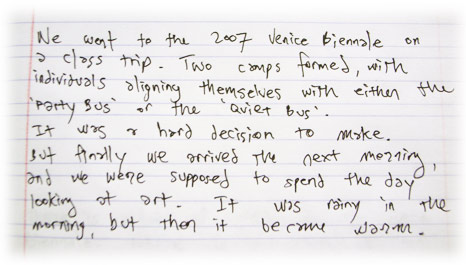 The question of life in art is not at least in part a question of reality and document, of truth and artifact. Insofar that life is being, it is the living element of a work of art, its energeia, which we recognise, or recognises us, is capable of moving us beyond our own mere lives towards truth and Heidegger’s sense of the world worlded, “more fully in being than the tangible and perceptible realm in which we believe ourselves to be at home.” To find, then, the evocation of life in the artwork does not set up a dichotomy as implied by the analogy of reality to document, truth to artifact. We can look perhaps more towards Adorno’s dialectics, not by way of simple polarities but a dialecticalism whereby one is contained in the other—art and life mutually inherent.
The question of life in art is not at least in part a question of reality and document, of truth and artifact. Insofar that life is being, it is the living element of a work of art, its energeia, which we recognise, or recognises us, is capable of moving us beyond our own mere lives towards truth and Heidegger’s sense of the world worlded, “more fully in being than the tangible and perceptible realm in which we believe ourselves to be at home.” To find, then, the evocation of life in the artwork does not set up a dichotomy as implied by the analogy of reality to document, truth to artifact. We can look perhaps more towards Adorno’s dialectics, not by way of simple polarities but a dialecticalism whereby one is contained in the other—art and life mutually inherent.![]() Even so, the “mere life” evoked in a work of art is by no means equal to reality. The distance between the two can be described as a greater truth or a place of the spirit, but perhaps, much less glamourously—not so far off from the gap between seeing someone’s endless vacation slideshow versus having been part of the real experience. One approaches a higher plane of being, the other is, very often, just a bore.
Even so, the “mere life” evoked in a work of art is by no means equal to reality. The distance between the two can be described as a greater truth or a place of the spirit, but perhaps, much less glamourously—not so far off from the gap between seeing someone’s endless vacation slideshow versus having been part of the real experience. One approaches a higher plane of being, the other is, very often, just a bore.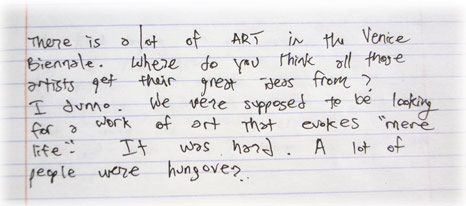 At the Biennale di Venezia, a near Disneyland of contemporary art and national identity, we are afforded the small world after all of contemporary art multiculturalism. The short examples following interest me here as different national perceptions positioning life relative to art. The stereotypes that emerge are perhaps an ironically self-conscious colouring of the ways the simulacra overtakes us even in self-presentation, but at the current stage of hyper visual culture, it is possible in this context to raise new questions regarding art as presentation (show, artifact, material, object) versus documentation (alternate reality, report, medium, subject).
At the Biennale di Venezia, a near Disneyland of contemporary art and national identity, we are afforded the small world after all of contemporary art multiculturalism. The short examples following interest me here as different national perceptions positioning life relative to art. The stereotypes that emerge are perhaps an ironically self-conscious colouring of the ways the simulacra overtakes us even in self-presentation, but at the current stage of hyper visual culture, it is possible in this context to raise new questions regarding art as presentation (show, artifact, material, object) versus documentation (alternate reality, report, medium, subject).![]() Japan, History and Tradition.The most physically direct form of document was created by artist Masao Okabe for the Japan pavilion. His work consisted of a series of 1,400 frottages made with pencil on paper, rubbed directly on the surface of stones that made up the World War II bombed platforms of the former Ujina train station in Hiroshima. Okabe’s work is a document of history, a literal tracing of stone as the ultimate testament to the fragilities wrought by war, where even rock is impermanent, its solidity transferred into the grainy shades produces by a sketch, no more certain than the dead flowers and leaves pressed under glass throughout the installation. His is a document of “mere life” in its most physical approach, but its results question the viability of history via transference across artifact, time and medium.
Japan, History and Tradition.The most physically direct form of document was created by artist Masao Okabe for the Japan pavilion. His work consisted of a series of 1,400 frottages made with pencil on paper, rubbed directly on the surface of stones that made up the World War II bombed platforms of the former Ujina train station in Hiroshima. Okabe’s work is a document of history, a literal tracing of stone as the ultimate testament to the fragilities wrought by war, where even rock is impermanent, its solidity transferred into the grainy shades produces by a sketch, no more certain than the dead flowers and leaves pressed under glass throughout the installation. His is a document of “mere life” in its most physical approach, but its results question the viability of history via transference across artifact, time and medium.![]() France, Love.Sophie Calle’s work can also be said to be evocative of “mere life” in the sense that it is largely autobiographical, and the source of her piece for the French pavilion is no exception, although this time Calle succeeds in moving her story outside of her own life and recapturing it through others— 107 other women, precisely. By asking each of the participants to translate, interpret or explain a break-up letter received from her lover, Calle is able to create a prism of images of the lives and perspectives of these women, revoiced in the form of dance numbers, linguistic corrections and psychological diagnoses among others. Insodoing, the acuteness of a supposedly ‘real’ emotional situation becomes estranged, dramatised and made multiplicitous. “Mere life” is simply a matter of perspective.
France, Love.Sophie Calle’s work can also be said to be evocative of “mere life” in the sense that it is largely autobiographical, and the source of her piece for the French pavilion is no exception, although this time Calle succeeds in moving her story outside of her own life and recapturing it through others— 107 other women, precisely. By asking each of the participants to translate, interpret or explain a break-up letter received from her lover, Calle is able to create a prism of images of the lives and perspectives of these women, revoiced in the form of dance numbers, linguistic corrections and psychological diagnoses among others. Insodoing, the acuteness of a supposedly ‘real’ emotional situation becomes estranged, dramatised and made multiplicitous. “Mere life” is simply a matter of perspective.![]() China, Future. Cao Fei’s use of the internet portal Second Life to create her video installation for the Chinese pavilion brings ‘reality’ directly into the art world, as it investigates a phenomenon that is transpiring in the immediate present, being translated across media from a virtuality through the internet to a mass phenomenon, not necessarily in terms of users but certainly by press coverage. The irony and fascination that Second Life poses for both Cao and the media is that the form of reality proposed by it is one that projects itself as a future for everyone, and the ambivalent possibilities proffered by this future are ones that reacts back upon the present of our “mere” everyday realities. Her documentary made entirely from footage of the voyages of her Second Life avatar, China Tracy, turn the strangely connected but utterly desolate world before us into a montage of cinematic moments, like nostalgic flashbacks of something not yet experienced.
China, Future. Cao Fei’s use of the internet portal Second Life to create her video installation for the Chinese pavilion brings ‘reality’ directly into the art world, as it investigates a phenomenon that is transpiring in the immediate present, being translated across media from a virtuality through the internet to a mass phenomenon, not necessarily in terms of users but certainly by press coverage. The irony and fascination that Second Life poses for both Cao and the media is that the form of reality proposed by it is one that projects itself as a future for everyone, and the ambivalent possibilities proffered by this future are ones that reacts back upon the present of our “mere” everyday realities. Her documentary made entirely from footage of the voyages of her Second Life avatar, China Tracy, turn the strangely connected but utterly desolate world before us into a montage of cinematic moments, like nostalgic flashbacks of something not yet experienced.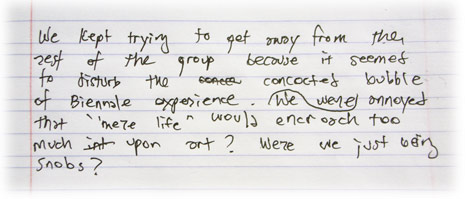 Why am I writing this again?
Why am I writing this again?![]() Oh yes, Biennale experience. Mere life.
Oh yes, Biennale experience. Mere life.![]() Is it a coincidence that this question of mere life is actually one of the primary themes of this year’s Documenta exhibition? Perhaps we should look outside of the context of a self-inflated art exhibition towards another, slightly-less-self-inflated-but-on-the-Grand-Tour-nonetheless art exhibition to get back to this question of mere life.
Is it a coincidence that this question of mere life is actually one of the primary themes of this year’s Documenta exhibition? Perhaps we should look outside of the context of a self-inflated art exhibition towards another, slightly-less-self-inflated-but-on-the-Grand-Tour-nonetheless art exhibition to get back to this question of mere life.![]() Or, perhaps mere life is merely in the looking.
Or, perhaps mere life is merely in the looking.![]() I’ll let you know after we get to Kassel.
I’ll let you know after we get to Kassel.
somewhere not around you
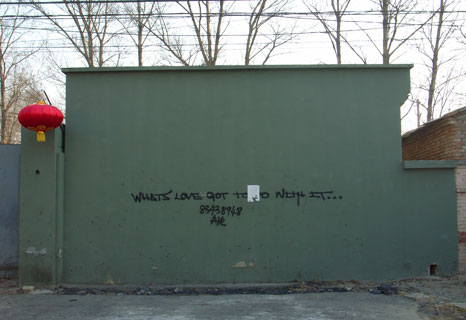 “The schizo knows how to leave: he as made departure into something as simple as being born or dying. But at the same time his journey is strangely stationary, in place. he does not speak of another world, he is not from another world: even when he is displacing himself in space, his is a journey in intensity, around the desiring-machine that is erected here and remains here. For here is the desert propagated by our world, and also the new earth, and the machine that hums, around which the schizos revolve, planets for a new sun. These men of desire—or do they not yet exist?—are like Zarathustra. They know incredible sufferings, vertigos, and sicknesses. They have their specters. They must reinvent each gesture. But such a man produces himself as a free man, irresponsible, solitary, and joyous, finally able to say and do something simple in his own name, without asking permission; a desire lacking nothing, a flux that overcomes barriers and codes, a name that no longer designates any ego whatever. He has simply ceased being afraid of becoming mad. He experiences and lives himself as the sublime sickness that will no longer affect him.” [Deleuze & Guattari, Anti-Oedipus]
“The schizo knows how to leave: he as made departure into something as simple as being born or dying. But at the same time his journey is strangely stationary, in place. he does not speak of another world, he is not from another world: even when he is displacing himself in space, his is a journey in intensity, around the desiring-machine that is erected here and remains here. For here is the desert propagated by our world, and also the new earth, and the machine that hums, around which the schizos revolve, planets for a new sun. These men of desire—or do they not yet exist?—are like Zarathustra. They know incredible sufferings, vertigos, and sicknesses. They have their specters. They must reinvent each gesture. But such a man produces himself as a free man, irresponsible, solitary, and joyous, finally able to say and do something simple in his own name, without asking permission; a desire lacking nothing, a flux that overcomes barriers and codes, a name that no longer designates any ego whatever. He has simply ceased being afraid of becoming mad. He experiences and lives himself as the sublime sickness that will no longer affect him.” [Deleuze & Guattari, Anti-Oedipus]
.but must i choose between truth and light, untruth and darkness? you and your sickness affect me, and so what then of it, you prick. must i take part, too, so long as you are happy? your cultural bullshit makes a we of i, but then what of the you? before it was about getting rid of this dance, the pronouns, because yes, we are all human, but your little hurricane can play with notions of society and take off when and if you please. what is wrong with choosing society, with wanting it, to take part in it, isn’t that here, too? i live it, plug into it every fucking day, on the bus, i wake up, step up, into, and fall back asleep again. some days are better than others. spring comes again. a mud ball shines like porcelain. i would like we to be happy, too. but if it’s my neurosis, your psychosis, still wanting to accept, just “somewhere not around you.” my love is a fucking wall right now, coupled with half-truths, awe-struck darkness and the grossest sadness. thanks for the process.
Posted by 丫 | more »the last weekend, or another day.
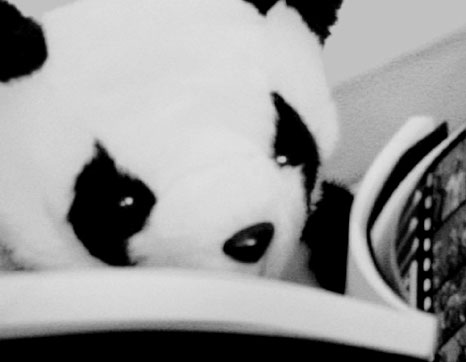 saturday, 11am – he is reading after cleaning the table. the weather disrupted his plans again, and now he only wants to stay inside. he was supposed to climb the great wall today, in a bid to fulfill a childhood dream before leaving his dream city. it’s only a former dream city now, after he has lived for a course of time long enough to discourage him with its indefinite sandstorm, its dog shit, its careless coughers. but before leaving he wants to make it to the great wall, not because it’s one of the must-visit places. he used to be a poet, crazy about all the pieces of mao style, and is always waiting for the time, after scaling the great wall, to repeat that famous line: 不到长城非好汉. he always believes if he fails to reach the great wall, he is not a (good) man.
saturday, 11am – he is reading after cleaning the table. the weather disrupted his plans again, and now he only wants to stay inside. he was supposed to climb the great wall today, in a bid to fulfill a childhood dream before leaving his dream city. it’s only a former dream city now, after he has lived for a course of time long enough to discourage him with its indefinite sandstorm, its dog shit, its careless coughers. but before leaving he wants to make it to the great wall, not because it’s one of the must-visit places. he used to be a poet, crazy about all the pieces of mao style, and is always waiting for the time, after scaling the great wall, to repeat that famous line: 不到长城非好汉. he always believes if he fails to reach the great wall, he is not a (good) man.
 saturday, 11am – he was trying to clean up, or cleaning up would have him. the last days were too much and everything had to go. yet at the same moment that something leaves him, another thing fills or comes to take place, like a fluid machine. he had lived long enough to want to forget, and maybe that would be okay for now, a tyranny of the unexpected newborn child. (“What was/is the purpose of this takeover? Can we accept a notion of ‘perfection’ in the flow of cultural/natural events? Can we presume that there is always a balancing tendancy to the equation?”)he thumps along to the music now, singing and dancing. but what (good) man will this baby grow up to be, a nomad, an anxiety attack?
saturday, 11am – he was trying to clean up, or cleaning up would have him. the last days were too much and everything had to go. yet at the same moment that something leaves him, another thing fills or comes to take place, like a fluid machine. he had lived long enough to want to forget, and maybe that would be okay for now, a tyranny of the unexpected newborn child. (“What was/is the purpose of this takeover? Can we accept a notion of ‘perfection’ in the flow of cultural/natural events? Can we presume that there is always a balancing tendancy to the equation?”)he thumps along to the music now, singing and dancing. but what (good) man will this baby grow up to be, a nomad, an anxiety attack?
visiting satish

toward a theory of the designwork Posted by 丫 | more »
i missed my flight
it was not my doing this time. or it was undoing, thinking a long layover could be taken advantage of, but they outdid their own delay once, then twice, and then they did not even bother to tell anymore that they were going to be even later still, and i somehow was passive throughout this process, thinking that the wet smudges in the air outside were big enough to cover all of us anyway… hoping that the connection would be delayed too so that i wouldn’t have to do any running. i’m so tired.
. i am catching this flight with the idea of being still. . three hours later i dozed on and off to the voice of the man in 6B, who stopped the flight attendant every time she passed by to ask how much longer it would be. i check my watch often, too. i can still make it, but i may have to run. i thought he was worried, but he was comforting a younger female voice behind me: “This is natural, you know, ’cause of the weather, but they know what they’re doing; it’ll be any minute now.” . In my sleep, we tumble like rocks. . When i open my eyes and look out of the window we have entered a painting. Everything is all grey. How can we be moving if forward and backward and past and present are all grey? . She is collecting the drinks now. . I doze again. When I open my eyes, the grey has become layered, but i can only see that we are sandwiched between other atmospheric crusts of slightly varying shades of grey. so not being able to move forward or backward or past or present has a depth, too. . But if we can’t see the ground below us, how will we land? . when we do, the passengers applaud. . “See? I told you we’d be all right. But you know, I was scared, too.” . The small voice of the girl behind me replies, “Thank you.”…
it is windy and loud to emerge on an air field in grey weather. the man greeting us at the bottom of mobile staircase wears a straight face with his fluorescent vest. when i ask him about possible delays for other flights, in particular the once-a-day flight to beijing on Air China, he responds equally matter-of-factly, with a point of his finger. i turn to see the huge whale of 747 looming just behind me, about 100 meters away. it’s windy and it’s grey and this plane has an overly festive looking curly red painted tail, but it is moving and i am standing still. my flight enters the taxi without me. . sigh… so close. . inside gate 24 it looks like christmas or thanksgiving. People are draped over chairs everywhere like meats and jellies, and all of the lights blink CANCELLED or DELAYED. . i was taking this flight with the idea of being still. yesterday i wrote to r about the acquiring of things as a way of being still. accumulation, and all the things packed neatly in two suitcases. now i stand in a line to inquire about them, and to ask someone to prove to me in writing that i missed my flight not because of my own doing but because of poor weather. the people at air china may not have noticed. “We made our flight, why couldn’t you make yours?” I imagine them saying to me indignantly. I would say to them, I was stuck in Boston being still. . it’s stressful like christmas or thanksgiving, and i begin to tear up in the queue for the ticketing desk. people understand. the young woman in front of me is sympathetic. we can laugh about it again before we get to the first turn in the wait line. we inch forward one step at a time. . i see the asian woman i met standing next to the over life-sized bust of freud yesterday with r. i think it was her. she had boarded the flight i wanted to take, the one that had boarded twenty minutes before mine, but now she has left the gangway ten minutes after me, looking slightly bewildered. she walks off to the right. after i ask r about her over the phone, i see her walking out of starbucks. we make eye contact, and i look for an acknowledgment of recognition, but she looks away. i keep waiting. . the woman in front of me and i stare together in amazement at a man who flails his arms angrily at the attendant assisting him behind the counter. she holds up something she’s scrawled on a notepad. his body reads all of his frustration, but unfortunately she is behind the counter and cannot see him communicating. oh wait, now she has let him behind the counter, and he has taken her seat in front of the computer while two of them look on from behind. . he appears to be choosing his own flight by now. . when he has returned to the passenger side of the counter i have reached the third row in the queue. there are four attendants helping him now. his arms are not flailing anymore. by the time he finally leaves the counter he looks quite satisfied. we inch one step forward. . the woman in front of me makes it to the counter and i overhear the attendant telling her that there are no more flights to Albany until tomorrow. but she doesn’t look overly disappointed, even when they tell her, “We don’t give hotel vouchers on account of delays due to weather.” I guess not, but somehow the bureaucracy and the rows of tired and upset meats and jellies seem a bit more than can be attributed to natural causes. whatever. we have already laughed about it. . the woman in front of me has finished and walked away already, so i step up and explain to the grim looking attendant, who checks the system and tells me that air china knew already, “they have you booked on tomorrow’s flight, same time.” and my bags? “we’ve sent them over there already, they should be there when you check in tomorrow.” Such foresight, those air china people. They knew that i have a history of missing flights? . but i fear now too much passivity, so i decide to go to the air china terminal to check for myself. “Air train to terminal 7,” the grim attendant tells me, and i head out of all of the holiday cheer of terminal 2. . A loop around the airport reveals that Air China is at terminal 1. It’s much more glamorous than terminal 2, like a stunted version of Foster’s Hong Kong airport, with long, sweeping white beams directing passengers along the hall. The destinations are more glamorous, too, with Albany and Akron being replaced by Paris and Tokyo. But there is no sign of Beijing, or Air China, for that matter. The sign directing passengers to the Air China desk leads me to a row of olive-skinned women wearing green uniforms. hmmm…very un-chinese. . I look around again, finally coming to pause in front of the JAL desk. Asian faces, grey uniforms with red scarves and neckties. hmmm…a little bit closer. . then, at a small unmarked desk to the right, the distinct sounds of mandarin. the voice belongs to an obachan wearing a deep red silk Chinese jacket embroidered with small black cherry blossoms. Great, this must be it. But why is there no sign? And when did Air China employees begin to wear lavender suits instead of red? . The lavender suited woman looks very stressed. She speaks sharply to obachan, who doesn’t seem to mind and says “I don’t care if you are getting off from work; I will hold you here if i have to. There is nobody else here. I have to speak with you.” She tells obachan that she can’t get ahold of them, that nobody is answering the phone. i wonder if she is trying to help obachan call her family. . Obachan and I wait for lavender suited woman while she calls up a group who has missed their flight to Montreal. She is very kind to them, offering them hotel vouchers with free dinner and breakfast. She tries to ignore us, but obachan holds her ground, following the attendant’s every move as if to say, “I’ve got you, see. You’re not leaving until you help me.” I hang on to her, too, thinking yes, me too, me too—-not really questioning why she walks back and forth to speak with the grey suited attendants at the desk to the left. . it takes me awhile to realise that the lavender suited chinese woman does not work for Air China; She is with JAL. . nobody answers the phone at Air China. . Obachan has missed the flight to Beijing, too. She is supposed to have surgery done there. Now what will she do? “I’ve been circling around the airport too many times today already. I will just sit and wait then. I don’t want to get lost again.” Lavender-suited woman tells us, “but this terminal closes at midnight. You can’t stay here overnight.” . So obachan and i are tossed together. I take her to the airport hotel, where we order bad Chinese take-out and and she tells me about coming to America eleven years ago. She is 68 now, with her daughter, son-in-law and four grandchildren living near Washington, D.C. She works in a factory four days a week from 3 p.m. to 2 a.m. to connect parts and wiring for some kind of machinery. She’s not afraid to return home alone at that hour. She is not afraid to fly alone. . “Things will happen as they are meant to, so why worry?” . She believes that we are taken care of by God above. She believes she’s a simple person, but she’s learned amazing things about America, about all men being created equal, and there is a lot that she thinks China still has to learn from America. We have a lot to learn from each other. . After eating, we both stop talking for a moment, look at one another and smile. . We are still for the night, having missed our plane.
Posted by 丫 | more »